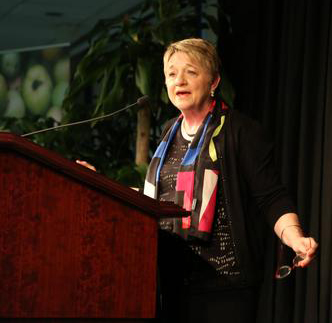By Aaron Weaver
Anti-hunger advocates must “accept the unfinished business” of their lives as they work together to end hunger in the United States, Cooperative Baptist Fellowship Executive Coordinator Suzii Paynter said at a hunger summit Oct. 1.
“The inspiration and arc of our lives is in God’s hands toward the kingdom of God,” Paynter said. “We’re not alone. We’re held in a great, fertile, hilarious imagination of God. … Join something, lead someone, be contagious, love with unimaginable love. Live your call without the credit because God isn’t finished with you yet.”
 Paynter’s challenge came during the opening night of Together at the Table: Hunger & Poverty Summit, a three-day gathering of anti-hunger and anti-poverty leaders and practitioners from across the country at Baylor University in Waco, Texas. The Texas Hunger Initiative — headquartered in Baylor University’s School of Social Work and launched by Texas Baptists’ Christian Life Commission — sponsored the summit in conjunction with Feeding Texas and the U.S. Department of Agriculture Food & Nutrition Service Southwest Regional Office.
Paynter’s challenge came during the opening night of Together at the Table: Hunger & Poverty Summit, a three-day gathering of anti-hunger and anti-poverty leaders and practitioners from across the country at Baylor University in Waco, Texas. The Texas Hunger Initiative — headquartered in Baylor University’s School of Social Work and launched by Texas Baptists’ Christian Life Commission — sponsored the summit in conjunction with Feeding Texas and the U.S. Department of Agriculture Food & Nutrition Service Southwest Regional Office.
In 2009, while director of the Christian Life Commission, Paynter partnered with the School of Social Work to launch the Texas Hunger Initiative, a project to end hunger in the state through public policy, education, community organizing and community development. The initiative now has almost 500 congregations serving as summer meal sites across Texas and has connected with more than 2,400 churches through its community partner program.
During her plenary address, Paynter shared how she awakened to the problem of hunger after, as a reading teacher, discovering that one of her students was collecting pencils to eat the erasers.
“That’s the day that I quit being blind to hunger,” she said.
Paynter said that she works to end hunger because “it’s the kind of redemptive act in the world that echoes the kingdom of God.” She emphasized the importance of collective impact as another primary reason for working to end hunger.
“We’re all born hungry in creation,” Paynter said. “Hunger, feeding, growing, living — this is the essence of life. In every city, in every age, we need to eat to live. Ending hunger is doable, and in the doing of it we become a better state, a better nation, a better world.”
Collective impact
Citing recent research from the Stanford Social Innovation Review, Paynter highlighted five conditions needed for successful collective impact to solve large-scale problems such as hunger — conditions she noted are present in the daily work of the Texas Hunger Initiative. These include the need for a common agenda, shared measurement and mutually-reinforcing activities.
“I know this community — the hunger and social service community,” Paynter said. “You are not competitors. You are collaborators. You hold a tremendous gift to this state and our country.”
She emphasized the importance of collaboration, noting that out of this commitment to collaboration, the CBF launched a rural poverty initiative called Together for Hope in 2001 to work with people in 20 of the poorest counties in the U.S. to affect change and break the cycle of economic disparity.
Paynter said that continuous communication and a well-developed support system or “backbone” are necessary elements for collective impact.
“While everyone is doing their job, it’s very hard for you to do your job and think about the big issue of ending hunger,” Paynter said. “There has to be a backbone, an organization that is doing just that, is working in Washington, D.C., or in your state legislature.”
Structure and strategy
In achieving collective impact, structure is as important as strategy, she added.
“Just having a good idea and a list of things to do is a very great starting place,” Paynter said. “But, if you don’t have the structure behind it, it will have a hard time being as effective as it was dreamed to be.”
Collective impact requires anti-hunger advocates to learn from each other “rather than just following a linear plan,” she said.
Paynter reminded the group there are no easy answers to solve the problem of hunger.
“There is no silver bullet. There is no one thing that is going to make [hunger] disappear. But, you know, we are a pretty darn good collection of silver buckshot. In your job … being able to look across the town, across the county line and see another glimpse of silver right over there — that’s where we get our strength. That’s who we are together at the table — not trying to be somebody else’s silver bullet.
“When I look out at this room, across our network, I see plenty of silver buckshot. There are remarkable miraculous gifts, an overabundance of gifts right in front of us every day.”
